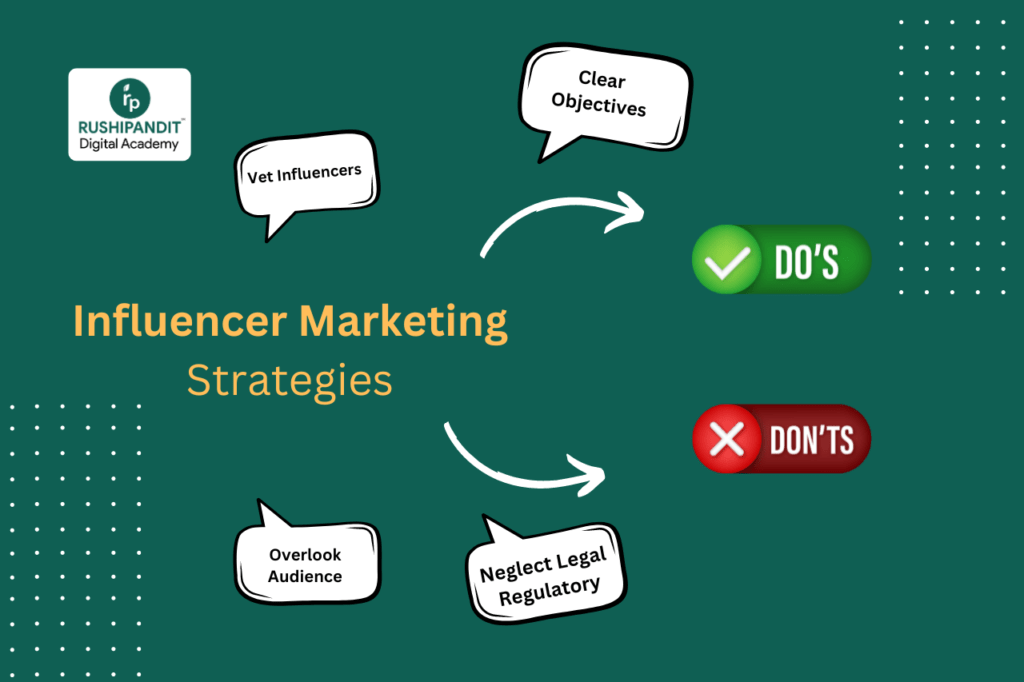In today’s rapidly evolving digital landscape, influencer marketing has emerged as a cornerstone strategy for brands aiming to forge authentic connections with their target audience. By leveraging the influence and credibility of social media personalities, brands can amplify their message, foster engagement, and drive tangible results. However, navigating the intricacies of influencer marketing requires a strategic approach and a deep understanding of best practices. In this comprehensive guide, we’ll delve into the essential dos and don’ts to help you navigate the world of influencer marketing successfully.
Table of Contents
ToggleThe Dos:
1. Research and Vet Influencers Thoroughly.
Before initiating any partnerships, dedicate ample time to researching and vetting potential influencers. Look beyond surface-level metrics like follower count and delve into engagement rates, audience demographics, and content quality. Ensure that the influencer’s values, voice, and audience align with your brand’s identity and objectives.
2. Establish Clear Objectives and Expectations.
Define your campaign goals, objectives, and expectations in detail before commencing any collaboration. Outline key performance indicators (KPIs), deliverables, timelines, and budget considerations. Transparent communication is crucial to ensure that both parties are aligned on the campaign’s scope and objectives.
![]()
3. Cultivate Authentic Relationships.
Authenticity is the cornerstone of successful influencer marketing campaigns. Focus on fostering genuine relationships with influencers based on trust, transparency, and mutual respect. Engage in open dialogue, collaborate on content ideas, and encourage influencers to inject their unique creativity and personality into sponsored posts.

4.Encourage Creativity and Personalization.
Empower influencers to create content that resonates authentically with their audience while aligning with your brand’s messaging and values. Avoid overly prescriptive guidelines and instead provide influencers with creative freedom to develop content that feels genuine and organic. Personalized and relatable content is more likely to resonate with audiences and drive engagement.
5.Measure and Analyze Performance Metrics.
Implement robust tracking and analytics to measure the performance and ROI of your influencer marketing campaigns. Monitor key metrics such as engagement rates, reach, impressions, click-through rates, and conversions. Analyze campaign data to identify trends, insights, and areas for optimization, enabling you to refine your strategy for future campaigns.

The Don’ts:
1.Overlook Audience Authenticity and Engagement.
Avoid being swayed solely by an influencer’s follower count or reach. Instead, prioritize audience authenticity and engagement metrics such as likes, comments, shares, and saves. Look for influencers with a highly engaged and loyal audience who actively interact with their content and trust their recommendations.
2.Engage in Inauthentic or Misleading Partnerships.
Maintain the integrity of your brand by avoiding partnerships that compromise authenticity or deceive the audience. Ensure that all sponsored content is clearly disclosed as paid partnerships, adhering to FTC guidelines and regulatory requirements. Transparency builds trust with both influencers and their audiences.

3. Neglect Legal and Regulatory Compliance.
Stay abreast of legal and regulatory considerations governing influencer marketing, including FTC guidelines, advertising regulations, and disclosure requirements. Ensure that all sponsored content includes clear and conspicuous disclosure labels, distinguishing it from organic content. Failure to comply with regulatory guidelines can result in reputational damage and legal repercussions for your brand.

4. Rely Solely on Influencer Metrics.
Look beyond surface-level metrics and evaluate influencers based on the quality of their content, relevance to your brand, and alignment with your target audience. Consider factors such as content quality, storytelling ability, authenticity, and brand fit when selecting influencers for partnerships. A genuine connection between the influencer and your brand will resonate more strongly with their audience.
5. Underestimate the Importance of Relationship Building.
Invest in building long-term, mutually beneficial relationships with influencers based on trust, respect, and collaboration. Cultivate open lines of communication, provide timely feedback, and demonstrate appreciation for their creativity and contributions. Nurturing these relationships fosters loyalty and encourages influencers to become enthusiastic advocates for your brand.
In conclusion, influencer marketing can be a powerful tool for brands seeking to engage with their target audience authentically and drive meaningful results. By adhering to these essential dos and don’ts, brands can navigate the complexities of influencer partnerships successfully and unlock the full potential of this dynamic marketing channel.
Ready to embark on your influencer marketing journey? Armed with these actionable insights, you’ll be well-equipped to forge impactful collaborations and achieve your marketing objectives in the ever-evolving landscape of digital media.


